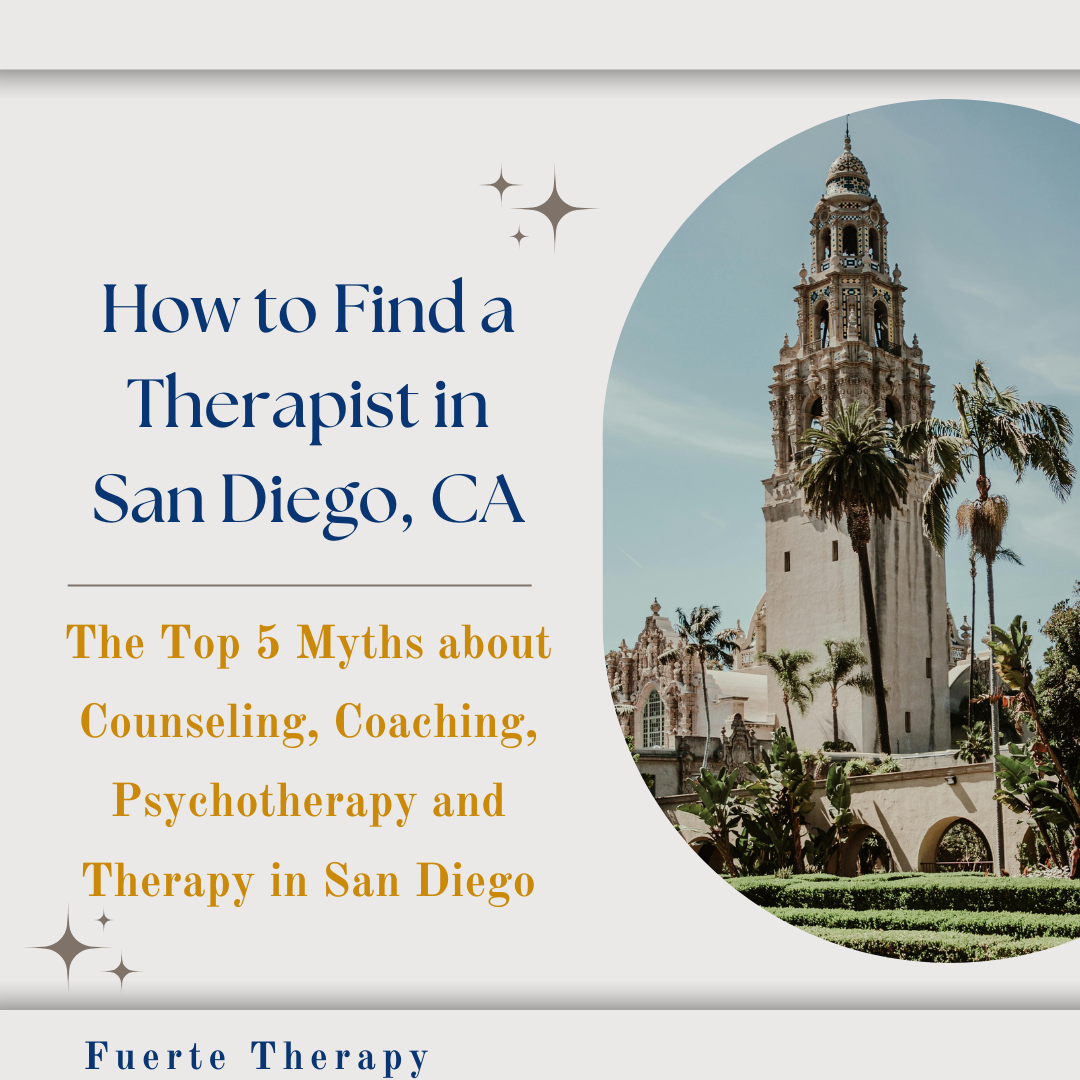The Top 5 Myths About Counseling, Coaching, Psychotherapy, and Therapy in San Diego
Unpack common myths about therapy in San Diego
San Diego is often painted as a dream city with gorgeous beaches, vibrant communities, and a lifestyle that blends laid-back vibes with ambition. But even in this beautiful place, people struggle. Behind the Instagram-worthy sunsets and farmers market smiles, many individuals are quietly dealing with anxiety, trauma, burnout, relationship challenges, or just that lingering feeling of something's not quite right.
Add to that the sea of wellness options available, such as life coaching, somatic healing, psychotherapy, mindfulness, and more, and it’s easy to feel overwhelmed or confused. What’s the difference between counseling and therapy in San Diego? Is coaching the same thing? Do I even need help, or should I just be able to figure it out?
Unfortunately, there’s a lot of misinformation out there. Myths about therapy keep people from seeking the support they need. Let's break those myths down, so you can make informed decisions about your mental and emotional well-being.
First, Let Me Say This: You Deserve Support, and I’m Here to Help
If you’re feeling unsure or overwhelmed by the idea of reaching out for support, I get it. Therapy is vulnerable. It takes courage to say, “I need something different.” I’m a Licensed Clinical Social Worker here in San Diego, and I specialize in working with adult trauma survivors. That means I prioritize your safety, autonomy, and pace every step of the way.
Whether this is your first time thinking about therapy in San Diego, or you’ve tried before and had a mixed experience, I want you to know: you’re not alone, and it’s okay to have questions. Let’s start by unpacking a few common myths that might be holding you back.
Myth #1: “Therapy in San Diego is only for people with serious mental illness.”
The Truth:
Therapy is for anyone navigating life. It’s for people working through trauma or anxiety, yes, but it’s also for folks exploring identity, processing grief, or setting boundaries.
Myth #2: “A life coach is basically the same thing as a therapist.”
The Truth:
Life coaches can be great for goal-setting and accountability, but they don’t have the same clinical training, licensure, or ethical requirements as therapists. Coaches aren’t trained to diagnose or treat mental health conditions, and they don’t have oversight like therapists do. If your struggles go deeper than motivation or productivity, therapy offers a safer and more holistic space.
Myth #3: “Therapists in San Diego just listen and nod, they don’t actually help.”
The Truth:
A good therapist does so much more than just listen. We collaborate with you. We help you make sense of patterns, develop tools to regulate your nervous system, explore root causes of pain, and foster healthier relationships with yourself and others. Yes, listening is part of it, but insight, support, and transformation are also very important pieces of the process.
Myth #4: “Talking about the past will only make things worse.”
The Truth:
Often, understanding past experiences brings clarity to your present. When approached thoughtfully, gently, and with tools to support you, revisiting your story can actually help you break free from it, not get stuck in it.
Myth #5: “If I just stay busy, I don’t need therapy.”
The Truth:
Staying busy can numb the pain, but it doesn’t resolve it. Over time, unresolved stress and trauma can show up in your body, relationships, or sense of self. Therapy offers a pause. A space to feel, reflect, and grow so you’re not just surviving, but actually living.
Frequently Asked Questions (and Things I Wish People Asked More Often)
1.“Will I have to talk about everything right away?”
Not at all. We go at your pace. Some clients start with the present moment and slowly work back. Others want to name the big thing right away. My role is to support you, not rush the process.
2. “What if I’ve tried therapy before and it didn’t help?”
That experience is more common than you’d think. Sometimes, it’s about the fit, not the process. Not every therapist is the right therapist for every person. You deserve a space that feels safe, affirming, and effective.
3. “How long does therapy take?”
That depends. Some folks come for short-term support around a specific issue; others stay for longer-term growth and healing. We’ll talk openly about what you need and revisit that conversation regularly.
4. “Why is therapy still so stigmatized?”
Stigma comes from generational messages, systemic issues, and a lack of education around mental health. But the truth is, taking care of your emotional health is as vital as taking care of your physical health. Seeking therapy is not weakness; it’s an investment in your well-being.
Let’s Bust These Myths Together
You don’t need to wait for a breaking point to start healing. You don’t need to have all the answers or the perfect words, and you definitely don’t need to go through it alone. If you’re curious about working with a trauma-informed therapist in San Diego, I’d love to connect.
Let’s have a real conversation about what support could look like for you.

